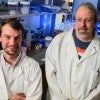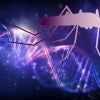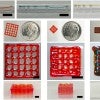
James Chappell wins NSF CAREER Award
Rice bioscientist James Chappell has won a National Science Foundation CAREER Award to develop RNA programming methods that can improve human health and the environment.

James Chappell wins NSF CAREER Award
Rice bioscientist James Chappell has won a National Science Foundation CAREER Award to develop RNA programming methods that can improve human health and the environment.

Upgraded tumor model optimizes search for cancer therapies
Rice U. bioengineers have developed an upgraded tumor model that houses bone cancer cells beside immune cells inside a 3D structure engineered to mimic bone and, through research using the model, found that the body’s immune response can make tumor cells more resistant to chemotherapy.

Rice labs seek RNA programming for ‘smart’ antibiotics
Rice University synthetic biologists are working to make “genetically encoded antibiotics” that kill only disease-causing bacteria.

Solomon launches Wild World podcast; Meteorite discovery in South Texas

Rice scientists reengineer cancer drugs to be more versatile
Rice University scientists enlist widely used cancer therapy systems to control gene expression in mammalian cells, a feat of synthetic biology that could change how diseases are treated.

Mosquito’s DNA could provide clues on gene expression, regulation
Rice University researchers discover that the Aedes aegypti mosquito’s DNA has the physical properties of a liquid crystal, a unique feature not found in any other species that could provide new clues on the factors that govern gene expression and regulation.

Peptide 3D-printing inks could advance regenerative medicine
How do you build complex structures for housing cells using a material as soft as Jell-O? Rice University researchers have the answer with a new 3D-printing ink.

STAT’s Hopkins co-authors National Academies report. CAREER Awards keep coming. DOE funds NEWT desalination research.

Kory Evans wins NSF CAREER Award
Kory Evans, an assistant professor of biosciences at Rice University, has won a prestigious National Science Foundation CAREER Award to study shape change in the skull of spiny ray-fin fishes across their evolutionary history.

New fluorescent dye can light up the brain
Rice chemist Han Xiao and Stanford researcher Zhen Cheng have developed a tool for noninvasive brain imaging that can help illuminate hard-to-access structures and processes. Their small-molecule dye is the first of its kind that can cross the blood-brain barrier, allowing researchers to differentiate between healthy brain tissue and a glioblastoma tumor in mice.

DNA repair scheme gets closer look for cancer therapy
Rice bioscientists took a close look at one of the ways cells repair broken DNA and made a discovery about a promising target for cancer therapy.

Pathogenic sensor’s surprising capabilities revealed
Rice synthetic biologists have uncovered new capabilities of a genetically encoded sensor that allows salmonella, E. coli and other pathogens to sicken millions of people each year.

Tropical wildlife follow the same daily patterns worldwide
A massive study of rainforest species across three regions of the world finds striking similarities in how animals spend their days.

Strategic planning process to be launched in January
President Reginald DesRoches shared the news with the Rice community in an email Nov. 21.

Rice facility is ‘one-stop shop’ for customizing DNA to fight cancer
Rice bioengineers, synthetic biologists and cancer researchers celebrated the opening of Rice’s first CPRIT Core Facility, the Genetic Design and Engineering Center, or GDEC, Nov. 10 at the BRC.